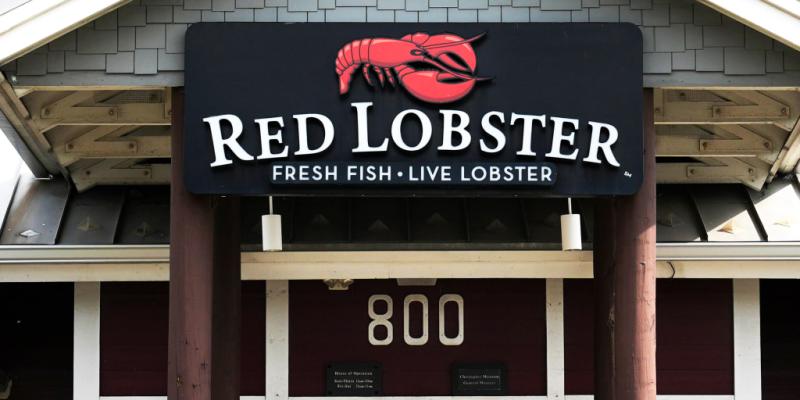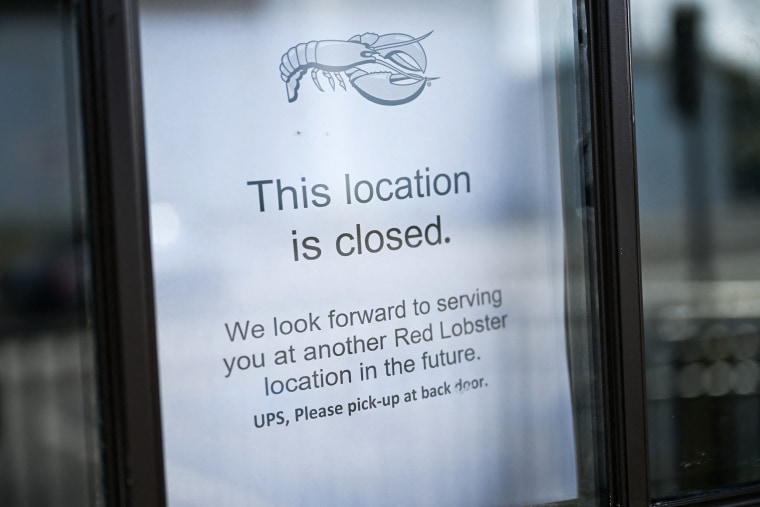How private equity rolled Red Lobster



Angry that your favorite Red Lobster closed down? Wall Street wizardry had a lot to do with it.
Red Lobster was America's largest casual dining operation, serving 64 million customers a year in almost 600 locations across 44 states and Canada. Its May 19 bankruptcy filing and closing of almost 100 locations across the country has devastated its legion of fans and 36,000 workers. The chain is iconic enough to be featured in a Beyonce song.
Assigning blame for company failures is tricky. But some analysts say the root of Red Lobster's woes was not the endless shrimp promotions that some have blamed. Yes, the company lost $11 million from the shrimp escapade, its bankruptcy filing shows, and suffered from inflation and higher labor costs. But a bigger culprit in the company's problems is a financing technique favored by a powerful force in the financial industry known as private equity.
The technique, colloquially known as asset-stripping, has been a part of retail chain failures such as Sears, Mervyn's and ShopKo as well as bankruptcies involving hospital and nursing home operations like Steward Healthcare and Manor Care. All had been owned by private equity.Asset-stripping occurs when an owner or investor in a company sells off some of its assets, taking the benefits for itself and hobbling the company. This practice is favored among some private-equity firms that buy companies, load them with debt to finance the purchases and hope to sell them at a profit in a few years to someone else. A common form of asset-stripping is known as a sale/leaseback and involves selling a company's real estate; this type of transaction hobbled Red Lobster.
In recent years, private-equity firms have invested heavily in all areas of industry, including retailers, restaurants, media and health care. Some 12 million workers are employed by private equity-backed firms, or 7% of the workforce. Companies bought out and indebted by private equity go bankrupt 10 times more often than companies not purchased by these firms, academic research shows. In a report this month, Moody's Ratings said leveraged buyouts like those pursued by many private-equity firms drive corporate defaults higher and reduce the amounts investors recover when the companies are restructured.
 A closed Red Lobster restaurant in Torrance, Calif., on May 14.Patrick T. Fallon / AFP - Getty Images
A closed Red Lobster restaurant in Torrance, Calif., on May 14.Patrick T. Fallon / AFP - Getty Images
The sale/leaseback that helped sink Red Lobster involved the July 2014 sale of premium real estate underneath 500 of its stores, which generated $1.5 billion. But that money didn't go back into Red Lobster; it went instead to the private-equity firm to finance its purchase of the chain, Red Lobster's press release said. That firm was San Francisco-based Golden Gate Capital, with $10 billion in assets.Golden Gate had paid $2.1 billion to buy Red Lobster in May 2014, so the real estate sale was crucial to the firm's financing. "Red Lobster is an exceptionally strong brand with an unparalleled market position in seafood casual dining," Josh Olshansky, managing director at Golden Gate, said at the time, a press release announcing the deal shows.
The $1.5 billion sale crippled Red Lobster. After the real estate was sold, Red Lobster had to pay rent on stores it had previously owned, significantly increasing its costs. According to the bankruptcy filing, by 2023 its rents totaled $200 million a year or approximately 10% of its revenues.
Asked about the negative impact the sale/leaseback had on Red Lobster, a Golden Gate spokeswoman declined to comment.
The company that bought the properties, American Realty Capital Partners, got a very good deal, the press release announcing the sale/leaseback said. It characterized the Red Lobster stores it had purchased as "irreplaceable locations" and "high-quality real estate located at main intersections in strong markets," but noted the properties were sold "at below replacement cost." Under the terms of the sale, Red Lobster would also see regular rent increases of 2% a year, the release noted.
American Realty Capital Partners was acquired by Realty Income in 2021. Realty Income did not respond to a request for comment on the sale/leaseback.
The sale of the Red Lobster stores hurt the company several ways. First, it meant the chain would not benefit from any upside in the commercial real estate market. In addition, the new owner of the real estate did not appear to give Red Lobster good deals on rents. As Red Lobster's CEO noted in a bankruptcy court filing, "A material portion of the Company's leases are priced above market rates."
As is typical in private-equity buyouts, Golden Gate's purchase of Red Lobster significantly increased the chain's debt, adding higher interest costs to its burden. In 2017, Moody's Ratings, an independent ratings agency, downgraded Red Lobster to a negative outlook from stable. Moody's cited the chain's "persistently high leverage," or debt.
"Carrying a lot of debt and not owning your real estate puts companies at a disadvantage," said Andrew Park, senior policy analyst at Americans for Financial Reform, a nonprofit and nonpartisan organization advocating for a stable and ethical financial system. "Red Lobster is yet another example of that private-equity playbook of harming restaurants and retailers in the long run."
In 2020, Golden Gate exited its Red Lobster investment, selling to Thai Union Group, a Bangkok-based company, and an investor group. Thai Union calls itself the "world's seafood leader" and its brands include Chicken of the Sea tuna products and King Oscar sardines. Terms of the transaction were not disclosed.
Regarding the bankruptcy, a company spokesman provided a statement saying, "Thai Union has a been a supplier to Red Lobster for more than 30 years, and we intend for that relationship to continue. We are confident that a court-supervised process will allow Red Lobster to restructure its financial obligations and realize its long-term potential in a more favorable operating environment."
 Former Labor Secretary Robert Reich, in Washington in 2019.Mark Wilson / Getty Images file
Former Labor Secretary Robert Reich, in Washington in 2019.Mark Wilson / Getty Images file
Bankruptcies of companies like Red Lobster have a multiplier effect on the overall economy and contribute to a sense of unease among consumers and workers, said Robert Reich, a former labor secretary under President Bill Clinton."One of the reasons people feel so insecure is you've got in the background, behind the curtain, a lot of these financial games that ultimately are making the very rich richer, and hurting America's working and middle class," Reich said in an interview. "All of the people who were supplying Red Lobster, all of the people who are essentially providing services to Red Lobster, the small businesses in the communities affected by mass layoffs, they are next in line, they are experiencing the ripple effect."
Red Lobster's employees are bearing the brunt of the collapse. Austin Hurst is one, a former grill master at a Red Lobster in Arizona. In an interview, he said he learned from a friend his store had closed and has not heard from his manager or any higher-ups at the company. He said he was told his store had been profitable until about 3 months ago.
"About a month before the close, the district manager came in and was like, 'Yeah, this Red Lobster is looking really bright. And you guys are going to stay open for sure,'" Hurst recalled.
Hurst said he was offered a job at another Red Lobster location but it requires a longer commute and pays $17 an hour, down from the $19 he was making before.
 Sen. Ed Markey, D-Mass., has proposed legislation to require greater transparency from health care entities owned by private-equity firms.Kevin Dietsch / Getty Images file
Sen. Ed Markey, D-Mass., has proposed legislation to require greater transparency from health care entities owned by private-equity firms.Kevin Dietsch / Getty Images file
Sen. Edward Markey, a Democrat from Massachusetts, where eight hospitals operated by bankrupt Steward Health Care are, recently held hearings on private equity and health care. He has also proposed legislation that would require greater transparency from health care entities owned by private-equity firms, including the disclosure of sale/leaseback arrangements as well as fees collected by the private-equity firm, and dividends paid by the health care entity to the private-equity fund."My legislation is quite simple," Markey said in an interview. "To make sure that these financial shenanigans don't have a profound impact upon communities across our country, the Department of Health and Human Services has to determine whether or not the sale of the land underneath these hospitals and then having that land rented back to the hospitals isn't having a negative impact on the provision of health care in that community."
Private equity is emerging in all parts of our economy, Markey added, but its most profound impact is in health care. "The more private equity gets into the hospital business," he said, "the more this is just a preview of coming atrocities affecting our health care system."



This article brings to mind the movie "Wall Street", and the expression commonly known as "Greed is good".
I believe that the expression "Greed is good" has become quite well known in America, and some might even consider it to be a very American concept. What it makes me wonder, as so many movie themes, plots and quotations have already done, whether if in this case 'Life Imitates Art" just as much as "Art Imitates Life".
It is called "the hidden hand of self-interest" which produces investment & jobs and the greatest life standard in the world.
Pretty straight forward for people who give a damn.
...and hundreds of thousands sleeping on the streets and under bridges, and millions struggling to feed their children three meals a day.
That is why we once had insane asylums and Methadone clinics, and I'll give you one guess who did away with all of that.
Normal human beings don't live in the street.
Is it really your opinion that the ONLY reason people have to live in the street is mental illness?
I just googled it-- and the U.S. ranks very high up. According to this article, we have the 8th highest GDP percapita in the entire world!
You really should point that out to all those people - I mean, with such a magnificent GDP per capita, what the hell are they doing sleeping under a bridge?
Why don't they at least have a tent like all these other rich people?
ronny raygun, while he was killing off all the aids victims by ignoring the problem. mr multi-tasker...
He was busy!
he's even busier in hell now ...
The private equity firms that do this sort of thing are bloodsucking pirates.
Unfortunately, in America you are a hero if you make money. How you make it barely even matters.
As long as the public remains brainwashed nothing will change.
Requiem for "The American Way".
Well that's because all Americans are right wing conservatives!
(Obviously If there were any progressives in America obviously that wouldn't be the case!)
CAPITALISM!!!! YAAY!!
Were you a frequent RL patron?
Insert Butker photo here...
after working in surf and turf fine dining for over a decade, I'm probably a bit jaded, but in my opinion the only thing that separated red lobster from fast food restaurants was the lack of a drive-up window.
In addition to the private equity buyout later Thai Union purchased Red Lobster and then more problems started. They had no idea how to run a restaurant chain in the US and put in much of their management but the most disastrous decision was to drop all their shrimp vendors and to buy only from Thai Union and a much higher price than they were paying and in much larger lots. They also brought in an outsider to find out why the corporate office in Orlando was doing better and it was decided that it had bad Feng shui so they abandoned the building but not the rent. They lost most all management that knew the business either by firing or them quitting as they saw the writing on the wall.
BTW, Thai Union purchased Chicken of the Sea a few years back and their operation in American Samoa and San Diego.
there's no mob left now, so republicans have allowed their corporate friends to bust out businesses and ruin lives for profit...
I don't know why they ever called it red lobster when 95% of the menu was shrimp, tiny little bait shrimp...
Exactly, all gone thanks to RFK.
Wow...I think even I could have done a better job
Sounds like private equity, as a practice, needs to be banned in this country but I don't see that happening any time soon.
How many of you were recent Red Lobster customers?
I think that I had my first Red Lobster meal in the early 70’s when sea food was relatively rare in the Midwest.
I patronized RL off and on when in the country until around 2000. By then there were multiple sea food chains with better food.
Last summer my wife and I went to a RL in walking distance of our hotel. We weren’t impressed. RL, Brown Derby, Chi Chi’s, Steak and Ale and others have seen their time come and go. Nothing new.
Closest Red Lobster to me is two hours away in Tucson from Douglas. Not worth spending 2 hours in a car each way and fighting city traffic just to eat seafood. Last time I had Red Lobster was about 20 years ago in Phoenix when visiting my late son who was going to college at the Scottsdale Culinary Institute in Scottsdale, AZ. Wasn't that great a dining experience.
I could be wrong about this, but I can’t agree with all the hand-wringing outrage over the demise of Red Lobster. Don’t blame private equity for working the system. It takes two parties to make a deal, and no one put a gun to RL’s corporate head and forced them to sell their land.
If Red Lobster were a restaurant with great food and great service at a great price, it would never have started liquidating itself. But let’s be real. Red Lobster was never a good seafood restaurant. Convenient dining, perhaps, but - food wise - basically the McDonalds of seafood. And even that’s generous because McDs is faster and cheaper.
The thing about McDonald’s, though, is they have always understood they are not just in the fast food business; they’re in the real estate business.
Considering there are other franchises that offer seafood plus lots of other options, it’s a miracle Red Lobster stayed in business this long.
None of that is private equity’s fault.
Liberals should start a campaign to save RL, eat there tomorrow and then once a week.
Why?
If they are upset at private equity firms, fight back.
I can count the number of times I've been inside a red lobster on one hand. the only things I could remember was the cheese biscuits which I liked, and puny shrimp. I've fished in the gulf with bigger shrimp as bait....
Damn those private equity firms.
I don't think I've ever been to a Red Lobster and I've never heard anything good about them anyway. I'm still pissed about Sears though because they did the same thing to Sears and I loved Sears. I have so many Craftsman tools and my snowblower and lawn tractor are Craftsman. I used to buy Kenmore appliances and loved them. While most car batteries are pretty good no matter what brand you buy I haven't had a battery for my lawn tractor last more than two years since my last real Sears Diehard which lasted a now incredible sounding 8 years.
I haven't been in a sears store in 40+ years. I bought sears tools and materials to remodel my first home. they got shitty with me over the return of a defective belt sander I had just bought and then didn't want to raise my credit limit by $50 to buy a new water heater, so I paid off my balance and cut up my credit card at the customer service desk. some manager caught up with me on my way out the door trying to explain that it was all a huge misunderstanding and I agreed with him and kept walking never to return. I finally got smart and showed my contractor's license at a local lumber retailer that sold everything else. I got a discount off retail and even better, they acted like they really wanted my business. soon after, I learned how to find the retail decision makers and negotiate the price of every major purchase, which would embarrass the ex to no end, making the thrifty process even more enjoyable.
Capitalism sucks!
What we need in this country is a good Socialist government-- that will lead to happier citizens!
Well I never shopped there but I enjoyed reading their catalogues.
And of course there was the song:
The B-52's - Rock Lobster
If what I've read that in America the rich are getting richer and the poor are getting poorer and the divide is widening, you could be right.
Just like the Catholic Church!
Exactly, just like the Catholic Church, may private equity achieve the same result.
Amen.
Actually there's nothing that quite like The Catholic Church!
I won't eat at McDonalds because IMO the food is unhealthy. However , apparently, from a purely business perspective-- they have been quite successful.
Not only is McDonald's food unhealthy, it's crappy as well. Burger King here is far superior (for unhealthy foods, that is).
Just read earlier that the guy who did the documentary "Supersize Me" on McDonald's food passed away yesterday. Wonder if there's a connection?
Actually, his documentary was a fraud. He claimed that his fast food diet caused his liver to turn to mush. Turns out he was a raging alcoholic. Everything in that doc had to be wiped
Like Precision Scheduled Railroading business method has and continues to destroy America's railroads from within.
I haven’t eaten at Red Lobster since they had an “endless” snow crab special many years ago. It was a joke. Getting a waiter’s attention for another plate was like pulling teeth, then they would return with a paltry and cold single claw that would be gone in no time. There was a little bar restaurant in the area that had the same deal, but they would happily load you up with mounds of hot snow crab without the wait. We have a RL down the road that I drive by almost daily but have never set food in. Not sure how they’ve made it this long in the first place.
The Woolworths got rich selling 5¢ and 10¢ goods. The Woolworths became filthy rich when they gave up and sold all their properties...
5 cents when Woolworth started was about $1.50 today. Which Woolworth “gave up and sold”?
And? Retail, brick and mortar, died. Never heard of TEMU?
And you didn’t answer the question, which Woolworths sold all of their property.
Yes, part of China’s e-commerce, selling low quality, discounted merchandise with no regard to data privacy, forced labor, or intellectual property.
What is your point?
Trying to figure out yours in 11
back in the 70's I started off as a stock boy at woolworths in the mall, then pet dept manager, for 2 years in high school and got school credits for it. at $1.60 per hour, I pretty much spent a big part of my weekly paychecks at the lunch counter. I remember seeing the lady that lived across the street from me buy a gun in our gun dept that she soon used to blow her husband's head off with though. never did learn what that was all about. her late husband had a pretty cool '69 GTX hemi, back when dodge made cars. huh, maybe she was jealous of that car...
In the South we had M.E. Moses and Ben Franklin 5¢ & 10¢ stores. I remember the smell of Guinea pigs, baby turtles and E-Coli...
we had a ben franklin in our little farm town. they got all my squirt gun, water balloon, marbles, and BB's business. my job as woolworths pet dept manager was to clean all the cages and tanks, and remove and count all the deceased animals. once while transferring birds from their shipping boxes to the communal cages, a box came apart and let a bunch of them loose. the ones that didn't fly into the storefront glass and escaped into the mall lived for years afterwards inside the mall. oops...
I liked going into the Woolworth's in Indiana, PA. It was right on Philadelphia (Main Street). They had a very large parrot in there one day and it kept saying hello to me and as I was walking away his hellos got more plaintive and desperate. I think he was looking for a friend. And I will never forget their grilled cheese sammiches.
I loved Woolworth's. It was Walmart before Walmart but a lot more. The Woolworths on State Street had a full candy counter where you could by malted milk balls by the pound, a lunch counter to sit and eat french fries and drink a chocolate milk shake. A section where you could buy fabric by the yard, a sewing section with bins filled with thread and needles, and buttons and hooks, a hardware section where you could buy a handful of nails or screws, a sporting goods dept that sold bowling balls and shotguns, a pet section filled with parakeets and goldfish, a clothing dept, a kitchen gadget dept, a toy dept, and always at the front of the store someone would be demonstrating the latest as seen on tv gadget. There was nothing like it.
I was forced by management to wear a mickey mouse costume for some picture with mickey disney promotion, but it was just a little too small. I didn't figure out what the asst managers thought was so funny and why so many high school girls were in line until the HR lady wanda freaked out made me get out of the costume and got one of the cashiers that was smaller to put it on. after viewing a few of the polaroids I soon figured out what the problem was.